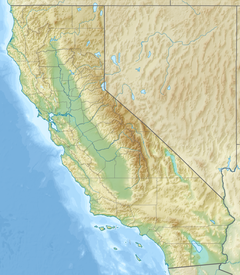Point Arguello Light

View from train August 29, 2010
|
|
|
California
|
|
| Location |
Point Arguello Santa Barbara Channel California United States |
|---|---|
| Coordinates | 34°34′37.4″N 120°38′49.9″W / 34.577056°N 120.647194°WCoordinates: 34°34′37.4″N 120°38′49.9″W / 34.577056°N 120.647194°W |
| Year first constructed | 1901 (first) 1934 (second) |
| Year first lit | 1967 (current) |
| Foundation | concrete base |
| Construction | wooden tower (first) metal skeletal tower (second) post light (current) |
| Tower shape | square parallelepiped tower with balcony and lantern (first) square pyramidal tower with balcony and lantern (second) |
| Height | 20 feet (6.1 m) |
| Focal height | 124 feet (38 m) |
| Original lens | Fourth order Fresnel lens |
| Current lens | aerobeacon |
| Light source | solar power |
| Range | 9 nautical miles (17 km; 10 mi) |
| Characteristic | Fl W 15s. |
| Fog signal | 2 blasts every 20s. continuously |
| Admiralty number | G3968 |
| ARLHS number | USA-612 |
| USCG number | 6-0210 |
| Managing agent | Vanderberg Air Force Base |
|
[]
|
|
Point Arguello Lighthouse is a lighthouse on Point Arguello, serving the Santa Barbara Channel, California adjoining Vandenberg Air Force Base near the city of Lompoc, California.
The original Point Arguello lighthouse, built in 1901, had a white square cylindrical tower attached to a one story keeper's house. It had a fourth order Fresnel lens, which was transferred from the Point Hueneme Lighthouse. The tower was replaced in 1934 by a square pyramidal skeletal steel tower, which was in turn replaced by the current post light.
The area of land now known as Point Arguello was originally known by the 'Chumashan—Canalino Indian' name "Nocto" and was part of the territory ruled by Chief Salipuata at the time of the occupation by the Spanish missionaries. The Native Americans were part of the third indigenous people in the area, the Canalino branch of the Chumash people. In Paleo-indian times, a people of Mongolian heritage first settled along the Southern California coast in areas where oak trees were plentiful, from which characteristic they have been named "The Oak Tree (Grove) People". They vanished some hundreds of years B.C.E., and after a period without archaeological evidence, a second semi—nomadic group arrived. These "hunting people" gradually merged with a third group, the Chumash people, as they settled here.
On August 28, 1769, the Portola expedition camped near Point Arguello, where they found a small Chumash rancheria. This area had many excellent flints, and so they named it Los Pedernales, The Flints. This name continued to be used for the point on Spanish maps until Mexican Independence in 1821. The American and non-Spanish European designation was Point Arguello, from the name given by George Vancouver in 1793, in honor of José Darío Argüello, then Commandant of the Presidio of Monterey.
...
Wikipedia

